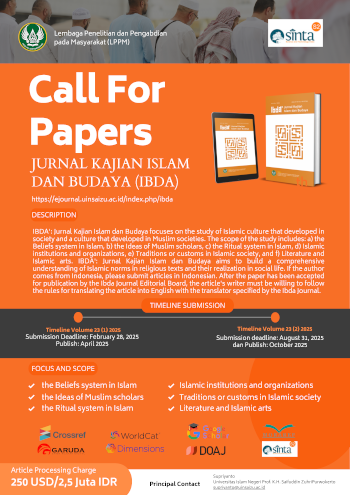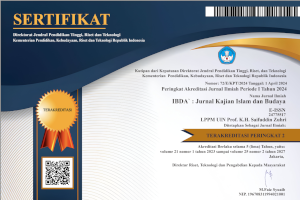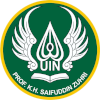Tracing The Khalwatiyah Order in The Tolitoli Regency Central Sulawesi
DOI:
https://doi.org/10.24090/ibda.v19i1.4164Keywords:
Tariqa, the Trace of Khalwatiya, Central SulawesiAbstract
This article discusses the history and process of transmitting the Khalwatiyah’s teachings in the Tolitoli Regency, Central Sulawesi. Researchers will examine problems with a socio-cultural-historical approach. The results indicate that The Khalwatiyah order that developed in Tolitoli is the Khalwatiyah Samman Order. This tariqa has entered Tolitoli since 1954, brought for the first time by Ambo Eko, a member of The Khalwatiyah order from South Sulawesi. This tariqa first spread in the village Bangkir located at The southernmost Tolitoli Regency. In the following period until the 1990s, this tariqa experienced significant development in the two districts, Galang and Lampasio, and then declinedDownloads
Download data is not yet available.
References
Bachtiar, W. (1997). Metodologi Penelitian Ilmu Dakwah. Jakarta: Logos.
Bodgan, R. dan S. J. T. (1975). Instrduction to Qualitative Research Method. New Yok: John Wiley & Sons, Inc.
Bruinessen, M. van. (1991). The Tariqa Khalwatiyya in South Celebes. In Harry A. Poeze (Ed.), Excursies in Celebes. Een bundel bijdragen bijhet afscheid van J. Noorduyn. Leiden: KITLV Uitgeverij.
Muhadjir, N. (2000). Metodologi Penelitian Kualitatif. Yogyakarta: Rake Sarasin.
Mulyati, S. (2004). Mengenal & Memahami Tarekat-Tarekat Muktabarah di Indonesia. In Ahmad Abrori (Ed.), Tarekat Sammaniyah Sejarah Perkembangan Ajarannya. Jakarta: Kencana.
Shihab, A. (n.d.). Akar Tasawuf Sunni dan Tasawuf Falsafi di Indonesia. Depok: Pustaka Iiman.
http://www.wikipedia.com/khalwatiyah diakses tanggal 25 April 2011
Bodgan, R. dan S. J. T. (1975). Instrduction to Qualitative Research Method. New Yok: John Wiley & Sons, Inc.
Bruinessen, M. van. (1991). The Tariqa Khalwatiyya in South Celebes. In Harry A. Poeze (Ed.), Excursies in Celebes. Een bundel bijdragen bijhet afscheid van J. Noorduyn. Leiden: KITLV Uitgeverij.
Muhadjir, N. (2000). Metodologi Penelitian Kualitatif. Yogyakarta: Rake Sarasin.
Mulyati, S. (2004). Mengenal & Memahami Tarekat-Tarekat Muktabarah di Indonesia. In Ahmad Abrori (Ed.), Tarekat Sammaniyah Sejarah Perkembangan Ajarannya. Jakarta: Kencana.
Shihab, A. (n.d.). Akar Tasawuf Sunni dan Tasawuf Falsafi di Indonesia. Depok: Pustaka Iiman.
http://www.wikipedia.com/khalwatiyah diakses tanggal 25 April 2011
Downloads
Published
2021-02-19
How to Cite
Saude, S., Hamka, H., & Kasmiati, K. (2021). Tracing The Khalwatiyah Order in The Tolitoli Regency Central Sulawesi. IBDA` : Jurnal Kajian Islam Dan Budaya, 19(1), 101–119. https://doi.org/10.24090/ibda.v19i1.4164
Issue
Section
Articles
License
Authors who publish with this journal agree to the following terms:
- Authors retain copyright and grant the journal right of first publication with the work simultaneously licensed under a Creative Commons Attribution-ShareAlike License a that allows others to share the work with an acknowledgement of the work's authorship and initial publication in this journal.
- Authors are able to enter into separate, additional contractual arrangements for the non-exclusive distribution of the journal's published version of the work (e.g., post it to an institutional repository or publish it in a book), with an acknowledgment of its initial publication in this journal.
- Authors are permitted and encouraged to post their work online (e.g., in institutional repositories or on their website) before and during the submission process, as it can lead to productive exchanges, as well as earlier and greater citation of published work (See The Effect of Open Access).
















